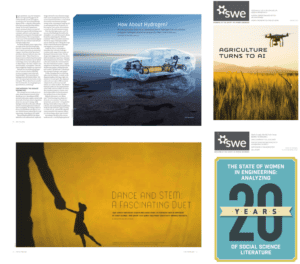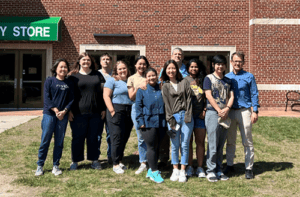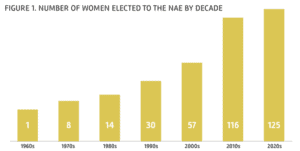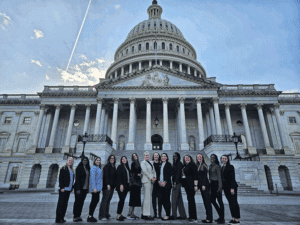SWE has announced the 2023 Advance Power Users of its Advance Learning Center. The three recipients attest to a variety of advantages to continuing technical and leadership education well into their careers.
By Laurie A. Shuster, Editor-in-ChiefThe 2023 Advance Power Users of the Society of Women Engineers’ Advance Learning Center — Danielle Schroeder, P.E., Jennifer Klenka, and Cora Degenhardt — work in a variety of disciplines and occupy different stages in their careers. But they all agree: Continuing education beyond academia is critical to career advancement and personal growth.
The Advance Learning Center is an online service that offers engineers and technologists a comprehensive suite of up-to-the-minute educational courses in career management and development; technical innovations; advocacy and outreach; self-management and development; and diversity, equity, inclusion, and belonging. Each year SWE honors those members who have completed the greatest number of courses with the Advance Power User Award. Recipients receive a grant toward registration at a WE annual conference for the same or following year, a professional digital headshot, a digital badge to add to their email signatures and LinkedIn profiles, and recognition through SWE newsletters and social media.
This year’s recipients approach their commitments to lifelong learning from different perspectives but find common ground in the notion that addressing technical and personal skills each have their place in fulfilling their career and life goals.
Danielle Schroeder, P.E., a transportation engineer with Gannett Fleming, earned a bachelor’s and a master’s degree in civil engineering from Drexel University in 2017. Schroeder considers continuing education a workout for the brain and has followed that belief for many years. “I equate it to going to the gym; you don’t go into weight training at 60 or 70 pounds, you go lower and build up,” she said. Her postcollege education has come from a variety of sources — some of them nontraditional. “I’ve gone to YouTube as a resource,” she said, especially for information about personal finance, a topic on which she presented in October 2023 at WE23 in Los Angeles. “Personal finance wasn’t something I already understood. So, it was good to find all these people who already had that information,” she said.
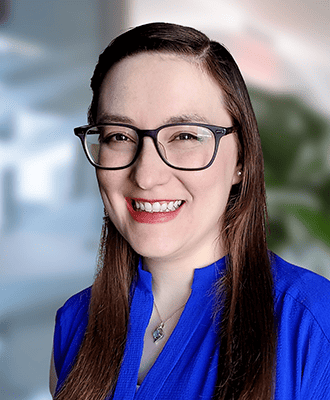
“I have been starting to do a little bit of mindfulness. There were things in the courses about getting away from your computer for a while and taking a walk, or finding ways to clear your head, and how that can actually help you with a problem once you get back to work.”
– Danielle Schroeder, P.E.
But it was SWE she turned to while she was a student member at Drexel, when she wanted to learn more about diversity, equity, inclusion, and belonging. Once she began to investigate the Advance Learning Center, she discovered other areas of interest, she said. “There were so many different things to go through, from communications skills to overcoming adversity, that are relevant regardless of your career.”
Schroeder recently earned a professional engineer license and looks forward to maintaining her professional development hours, called PDHs, through the center’s more technical course offerings. “I can use them for the renewal process in 2025,” she said.
The center’s courses, as well as Tech Talks at SWE’s annual conference, have helped her learn about technical advancements inside and outside of civil engineering, she said. “It’s good to keep your mind nimble and learn about the new technologies that exist and how to incorporate them into your projects make systems more efficient.”
“It’s good to keep your mind nimble and learn about the new technologies that exist and how to incorporate them into your projects make systems more efficient.”
But she has been most excited about the courses covering mental health and stress. “I have been starting to do a little bit of mindfulness. There were things in the courses about getting away from your computer for a while and taking a walk, or finding ways to clear your head, and how that can actually help you with a problem once you get back to work,” she said.
Schroeder was also excited to learn how to lead hybrid teams, even though this is not yet part of her job. “In my work with professional associations like SWE, I am leading global teams in that way, and I have been able to incorporate what I learned,” she said.
Schroeder plans to pursue a project management professional certification, known as a PMP, and will be looking for courses on relevant topics to support her goals. “Technology is changing. Our standards are changing,” she said. “You always need to make sure you are using the most up-to-date standards and codes.”
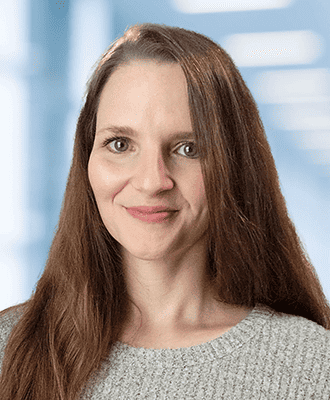
“It helps to keep up in case I ever have to switch gears and find a new opportunity that sounds exciting. If I wasn’t up to speed, I might not have the skills to pursue that opportunity. And that would be a missed chance.”
– Jennifer Klenka
Keeping current
For Jennifer Klenka, a software engineer who has worked her entire 15-year career at Lockheed Martin, continuing technical education is simply a matter of professional survival. “In software engineering, things are constantly changing,” she said. She earned a bachelor’s degree in computer engineering at The University of Texas at Arlington, where she was taught the programming languages C and C++. But her husband, a software engineer studying just a few years behind her, was taught Java. “I never learned Java,” she explained. “And then I did an alumni networking event at UTA a couple of weeks ago, and they are back to doing C and C++ again! Things are changing all the time, and I have to keep up.”
She later earned a master’s degree in systems engineering at Cornell University, and she now takes many courses on her own time. She is certified as an associate systems engineering professional, a Six Sigma black belt, an electronic warfare technologist, and a nutrition coach.
“I always want to learn new things, but I may not always be able to do that on the job,” she said. “It helps to keep up in case I ever have to switch gears and find a new opportunity that sounds exciting. If I wasn’t up to speed, I might not have the skills to pursue that opportunity. And that would be a missed chance.”
An Instagram post alerted her to the offerings from the Advance Learning Center. At first, she took courses that taught her about SWE and the outreach options it makes available to members. “I was excited to learn what the opportunities are,” she said, and she has signed up to work as a counselor with a local high school.
The course that had the most impact on Klenka is one that teaches the differences between a mentor and a sponsor.
She later examined the courses on technical topics — even those that didn’t necessarily relate to her specific engineering discipline. “It taught me about the medical challenges that were being overcome because of COVID-19; I had no idea that kind of stuff was going on in the background,” she said. “And I liked Meet Me in the Metaverse and courses on what leaders in science can do.”
But the course that had the most impact on her, she said, is one that teaches the differences between a mentor and a sponsor. “It was about how those roles are not the same. Your sponsor is more of an advocate for you, talking to executive leadership about you, and helping you find opportunities. A mentor is guiding you in how to go get those opportunities.”
Klenka looks for lifelong opportunities everywhere. She recently took advantage of the training available at WE23. “There was a session they talked about communications styles in meetings. They used an animal for each type of person. For example, a lion likes to talk a lot in the meeting, and a bird waits for its turn to talk. Those stood out to me.
“I saw that sometimes I am like the bird trying to be polite and wait for my turn to talk,” she said. “I’ve sat in meetings before where the whole meeting went by, and I never got to say what I wanted to say; I was being too polite. The animals helped me put it in perspective. It inspired me to speak up more.”
A keynote at WE23 introduced her to the idea that “there are people who can process information in real time and then there are post-processors. That made sense to me because I am a post-processor. I need time to absorb what happened in the meeting. There are people in meetings who are just go-go-go with their ideas, and she talked about how to handle that.” Those tips, she said, will stay with her as she progresses through her career.
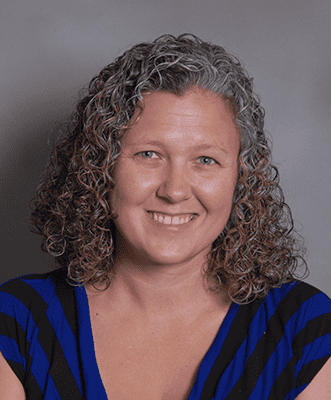
“The course went into statistics that show men are seen as providers, so when they have another child to provide for, it’s like, ‘Well, we need to give him more money now.’ And it’s not the same for women.”
– Cora Degenhardt
Switching gears
Cora Degenhardt, an engineering project manager for Kimberly-Clark with two decades of work experience behind her, says consistent learning has been key to her career progression. She has changed roles many times in her career, and each time, she starts with education.
“I’ve held roles as a quality engineer for a computer numerical control manufacturing company, an engineer for a food manufacturer, a project engineer for a company that makes cylinders for things like Coleman camp stoves, and a process engineer for a circuit board manufacturer,” she said. “Prior to that I was a district manager for Pierce Manufacturing for their service centers. I had to learn new things at each of these new roles.”
The first thing she does when entering a new position is to examine the machinery, technologies, and techniques that are used in her place of business and research each of them. “It could be investigating what equipment we have in our manufacturing facilities, seeking out trade shows, or taking training on technology that is new to me,” she said. And while it may seem daunting to start over at each new position, she said, “It is shocking that I have found so many similarities between so many diversely different manufacturing scenarios. I worked at a company that filled propane cylinders, and the same company that made our machine that did that made the machine that filled cheese cups at a later position.”
In addition to courses from SWE’s Advance Learning Center, Degenhardt has taken more than 150 online training courses through Kimberly-Clark in just the one and a half years she has worked there. She explained that whenever her regular work is completed, “I always look for something to learn. I have a really difficult time doing nothing.”
“I always look for something to learn. I have a really difficult time doing nothing.”
An Advance Learning Center course on implicit bias made a significant impression on her. The course mentioned the “prove it again” concept, which holds that women are often asked to prove and reprove their skills in ways that men are often not. “Because I’ve had so many role transitions, each time I have had to prove again that I could do the job and that I knew the job,” she said. “And the thing is, I do it every time. I’ve consistently been either at the top or near the top in performance when you compare employees at the roles I’ve been in.” The course helped her understand that going forward, “You don’t have to prove it. But you can show it.”
Another eye-opening course dealt specifically with identifying bias in performance reviews, which introduced the idea that being a parent tends to be a net positive attribute for men in the workplace but not for women. “The course went into statistics that show men are seen as providers, so when they have another child to provide for, it’s like, ‘Well, we need to give him more money now.’ And it’s not the same for women.”
Like the others, Degenhardt believes lifelong learning is a never-ending pursuit. Her next move? “I have started studying for the law school entrance exam, the LSAT,” she said. “I am planning to go back to get my juris doctorate with a focus on intellectual property law so I can advance in my career at Kimberly-Clark.
“We’re in the business of innovation, and we are constantly researching new materials and new ways to put things together, or to make the machines run more efficiently with less waste, or ways to be more sustainable, or ways to make the products less expensive and more durable. And we’re going after all of that at the same time,” she said. “We develop a lot of intellectual property that we have to be careful to manage and protect. I want to be a part of all of that innovation; that’s what excites me.”

